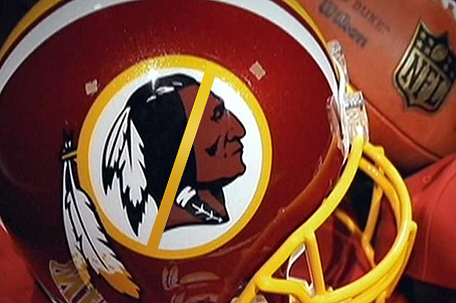
By Joseph White
Associated Press
WASHINGTON — The U.S. Patent Office ruled Wednesday that the Washington Redskins nickname is “disparaging of Native Americans” and that the team’s federal trademarks for the name must be canceled.
The 2-1 ruling comes after a campaign to change the name gained momentum over the past year. The team doesn’t immediately lose trademark protection and is allowed to retain it during an appeal, which is likely.
Redskins owner Dan Snyder has refused to change the team’s name, citing tradition, but there has been growing pressure including statements in recent months from President Barack Obama, lawmakers of both parties and civil rights groups.
The decision means that the team can continue to use the Redskins name, but it would lose a significant portion of its ability to protect the financial interests connected to its use. If others printed the name on sweatshirts, apparel, or other team material, it becomes more difficult to go after groups who use it without permission.
The case involves six registered trademarks that involve the use of the word Redskins, but it does not apply to the team’s logo.
The decision by the Trademark Trial and Appeal Board is similar to one it issued in 1999. That ruling was overturned in 2003 in large part on a technicality after the courts decided that the plaintiffs should have filed their complaint soon after the Redskins registered their nickname in 1967.
The new case was launched in 2006 by a younger group of Native Americans, and was heard by the board in March of last year.
The group argued that the Redskins should lose their federal trademark protection based on a law that prohibits registered names that are disparaging, scandalous, contemptuous or disreputable.
Suzan Shown Harjo, one of the plaintiffs who testified at last year’s hearing, said she was “thrilled and delighted” with the decision. Snyder declined to speak to reporters as he walked off the practice field, but the team said it planned to release a statement later in the day.
In Washington, lawmakers who have pushed for a name change applauded the decision. In May, half of the Senate wrote letters to the NFL urging the team to change its name.
“Daniel Snyder may be the last person in the world to realize this, but it’s just a matter of time until he is forced to do the right thing and change the name,” said Senate Majority Leader Harry Reid, who has said previously he will not attend home games until the team changes its name.
This decision by the TTAB does not necessarily put an end to the larger dispute between the parties, as Pro Football, Inc. may seek review by a federal court of today’s decision. The registrations will remain “on the federal register of marks” and not be listed in the USPTO’s records as “cancelled” until after any judicial review is completed.
• What this decision means: if the cancellation of the registrations for the trademarks involved in this case is not appealed or if affirmed following possible review by a federal court, Pro Football, Inc., as record owner of the involved registrations will lose the legal benefits conferred by federal registration of the marks. These benefits of federal registration include:
— the legal presumptions of ownership and of a nationwide scope of rights in these trademarks;
— the ability to use the federal registration ® symbol, and;
— the ability to record the registrations with the U.S. Customs and Border Patrol Service so as to block the importation of infringing or counterfeit foreign goods.
• What this decision does not mean: this decision does not, however, require the Washington D.C. professional football team to change its name or stop using the trademarks at issue in this case.
— Losing the federal registration of a trademark does not necessarily mean that the owner loses all legal rights in the mark. This is because trademark rights in the United States come from use of a mark on or in conjunction with goods or services, not merely from the additional, optional step of federal registration.
— The TTAB determines only whether a mark can be registered with the federal government (and thus gain the additional legal benefits thereof), not whether it can be used.
— The mark owner may still have rights in the mark based on use, known as “common law” rights – and those use-based rights may continue to exist even if a federal registration is cancelled.















Leave a Comment